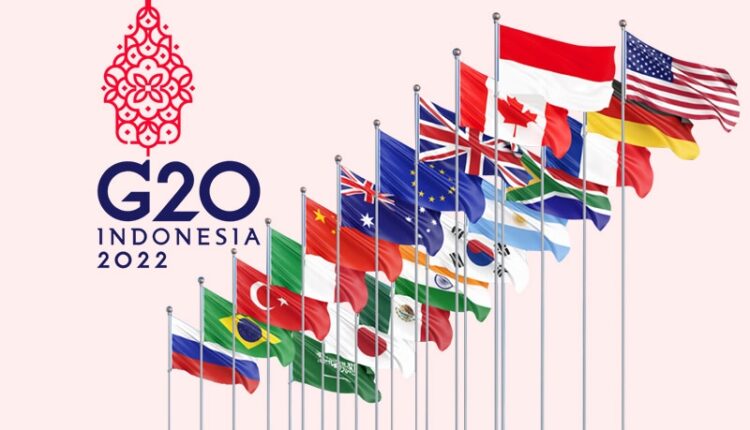Indonesia’s G20 Presidency Encourages Global Collaborative Development Efforts
By: Ahmad Dzul Ilmi Muis)*
Indonesia’s G20 presidency continues to encourage all member countries to be able to increase collaborative development efforts in the world. This is aimed at recovering and rising together can be achieved immediately in order to face the many global crises that have recently continued to threaten.
The global financial crisis of 1997–1999 triggered various developed countries to move quickly to find solutions to restore the world economy. Countries that are members of the G7 (Group of Seven); The United States, Britain, Italy, Japan, Germany, Canada and France, concluded that the fastest way to recover the world economy is by collaborating with many other developed and developing countries.
Starting from the idea and awareness of the members of the G7 countries, that it is very important to carry out collaborative development at the world level, even by involving and embracing developing countries. The initial idea, middle countries and have systemic economic influence in global negotiations was embraced in the meeting of the Minister of Finance and the Governor of the Central Bank.
This is where the forerunner of the G20 was born, where the meeting involved 12 additional countries (Mexico, Argentina, Russia, South Africa, Saudi Arabia, Turkey, China, South Korea, Indonesia and Australia, Brazil, and India) outside the G7 plus one. European Union economic area.
Then since 2008, the G20 has presented Heads of State at the summit and in 2010 a discussion in the development sector was also formed. Since then the G20 consists of the Finance Track and the Sherpa Track . Sherpa is taken from the term for guides in Nepal, describing how the G20 Sherpas paved the way to the Summit.
No half-hearted, even all the countries of the G20 have a very important role, especially in the economic field. The reason is that cumulatively, the countries that are members of the G20 are estimated to control around 90 percent of the gross domestic product (GDP) of the world economy, 80 percent of the volume of world trade, and represent two-thirds of the world’s population.
So it is clear, it can even be said that the economic strength of the G20 countries can represent how market power and also the flow of trade traffic is even in the world. Because if in total, indeed all G20 countries themselves have been able to reflect more than about 60 percent of the world’s population, with 75 percent of global trade and 80 percent of world GDP.
It seems that the G20 has been given an important role by taking over the task of solving economic problems and the increasing role of developing countries in addition to developed countries in policy making at the G20, namely the enlarged role of developing countries in influential multilateral bodies such as the International Monetary Fund (IMF) and World Bank (World Bank).
The opportunity for dialogue that is mutually open in two directions, between developed countries and also developing countries regardless of status and considers all equals is indeed the best effort to be able to make a global recovery as soon as possible after the world was hit by the COVID-19 pandemic until the long impact is that many threats emerge. multidimensional crisis as it is today.
Developed countries are now distributing problems to other countries. The burden of the global financial crisis also wants to be borne by other countries through the changing role of the G20. The credibility of the new role of the G20 cannot be seen now. Reforms in international institutions such as the IMF and the World Bank are at stake for the commitment of developed countries to share power.
It is undeniable that the role of developed countries as members of the G20 is also very important because their strength is needed to be able to help each other developing countries, especially in solving world problems together and collaboratively, even helping the development of vulnerable countries.
The Coordinating Minister for Economic Affairs, Airlangga Hartarto, explained that the G20 Forum has also facilitated the transfer of knowledge and competencies to improve prevention, preparedness, and response to pandemics. He hopes that this collaboration between one country and another can produce an exit strategy from the pandemic problem.
As the G20 Presidency, Indonesia itself will continue to encourage collaborative efforts by large groups of countries so that they can create concrete results in overcoming many world problems, including by reforming the global health architecture, establishing a Joint Finance and Health Task Force and transferring vaccine production technology.
On another occasion, the Minister of Finance, Sri Mulyani, believed that indeed all G20 member countries should continue to increase their cooperation in an inclusive and collaborative manner in order to achieve sustainable infrastructure development for the world. According to him, to support this to happen, it must be accompanied by a sustainable financial mechanism, so it is clear that the contribution of all countries cannot be avoided at all.
As the host or the Presidency at the G20 Summit, Indonesia continues to encourage all member countries to be able to work out ways so that global collaborative development can be carried out as well as possible. The reason is that only by helping each other, the world is able to fight various kinds of crises that await in front of its eyes. Because it is impossible for one country to fight it alone.
)* The author is an Alumni of Unair Surabaya
